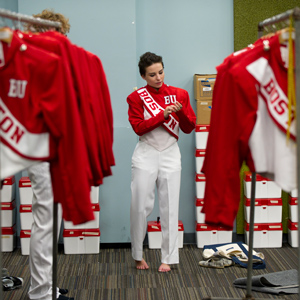Fiction
Proof of Lies: An Anastasia Phoenix Novel
Diana Rodriguez Wallach (COM’00)
Entangled Publishing
The first installment in Rodriguez Wallach’s young adult spy thriller trilogy introduces readers to gutsy teenage heroine Anastasia Phoenix, whose parents’ jobs with the mysterious Dresden Chemical Company have brought the family to Boston. Anastasia and her older sister, Keira, are used to being perennial new kids, but when their parents announce that they must uproot yet again, Anastasia has had enough. After a bitter fight with her parents, she decides to stay with Keira, who is enrolled in medical school at BU. The fight turns out to be Anastasia’s last interaction with her parents, who die in a car accident.
Fast-forward three years, and Anastasia is in Keira’s care, living in the family home with a roommate, tech-geek and hacker extraordinaire Charlotte. Keira, who has dropped out of medical school, struggles with the responsibility of her sister’s guardianship, and is prone to throwing wild parties. After one such party, she goes missing, leaving behind a bloody crime scene.
Anastasia believes her sister is still alive, and with Charlotte’s help, she discovers evidence that an acquaintance of her parents who lives in Italy might have a lead on Keira’s disappearance. With financial support from Dresden’s enigmatic CEO Randolph Urban, Anastasia sets off to Tuscany to investigate. At her side on the adventure—at Urban’s insistence—is the handsome Marcus, a new student at Anastasia’s high school and another child of Dresden employees.
Rodriguez Wallach balances an action-packed narrative with carefully crafted portrayals of the locales Anastasia’s journey takes her to. BU readers will delight in the familiar depictions of the family’s tree-lined Brookline street, Storrow Drive, and the North End; travel lovers will enjoy her colorful descriptions of Tuscany and Rome, from rustic coffee shops to sprawling churches.
The gripping book ends with a twist that will have readers eagerly anticipating the next installment in the series.—MARA SASSOON
Nonfiction
The Band FAQ: All That’s Left to Know about the Fathers of Americana
Peter Aaron (CGS’85)
Backbeat Books
To learn the story of the influential rock group the Band, read the memoirs of drummer Levon Helm or guitarist Robbie Robertson. Better yet, read both, as at times they have, um, contrasting memories of their oft-contentious history. Then pick up Aaron’s sturdy almanac of capsule histories and reviews, background info, musical analysis, and engaging trivia.
The Band was known as the Hawks until 1965, when the five rockabilly road warriors hooked up with Bob Dylan, who was looking for a group to turn his new electric sound into a touring vehicle. They changed rock with the music they made in ’67 and thereafter at an upstate New York house that became known as Big Pink. With Dylan and on their own, the Band all but created the rootsy, rural Americana sound that survives today (via the Avett Brothers, Wilco, the Jayhawks, and a gazillion others), before breaking up in spectacular fashion with the all-star ’76 concert “The Last Waltz.”
Aaron opens with capsule bios of Robertson and Helm, plus bassist Rick Danko, and keyboard players–multi-instrumentalists Garth Hudson and Richard Manuel. He follows a quick history with a chapter on what made the group unique, from no “front man” to “the Canadian-American factor.”
A chapter on the Band’s greatest songs should erase any doubt that the group is worthy of such a tome, with notes on “The Weight” (with the classic opening lines “I pulled into Nazareth/was feeling about half-past dead”) and “I Shall Be Released” (written by Dylan). Aaron goes heavy on context and history, and occasionally offers an assessment of a song’s place in the American pantheon. Of “The Night They Drove Old Dixie Down,” he writes, “In a mere three minutes and thirty-three seconds, this heroic song conjures the same level of Civil War tragedy and defiant Southern grit that Gone with the Wind takes almost four hours to put forth.”
A fan might wonder how it’s possible that “Stage Fright” is not on the list of the Band’s best work, but then, isn’t starting arguments what lists like this are for? The Band FAQ is, in a way the group’s members might appreciate, a classic barroom argument settler, a worthy companion to some of rock’s finest music.—JOEL BROWN
Left-Handed in an Islamic World: An Anthropologist’s Journey into the Middle East
John P. Mason (GRS’71)
New Academia Publishing
The desert called to Mason. It was so different from Boston, where as a BU student he watched the historical epic Lawrence of Arabia in a movie theater. He recalls a scene from the 1963 Oscar winner where the mysterious British archaeologist and army officer T. E. Lawrence came “loping onto the screen on camelback, seeming to float on the desert—and into my life.”
In this hybrid memoir-history-ethnography, Mason reflects on his 50-year career in the Middle East, living in Arab-Berber Muslim communities. His intention, he writes, was to “study their work, their ownership of land, who they married and how new kinsmen fit into their lives, their social and religious traditions, and the general round of activities of these desert villagers over the course of a year.”
His accounts are saturated with sensory descriptions, like encountering optical illusions in the desert. “I swore that what I saw was a seascape, which appeared to have water vapor rising from it….It took a while to adjust to this new sensation.”
The book interweaves history and politics—tracing the role of NATO’s response to Libya’s leader Muammar Gaddafi in the rise of ISIS—with the personal. Mason relates how having children changed the nature of his work in the troubled region, and how his responsibilities shifted as the United States entered into war with Iraq.
He draws the narrative to a close in 2016. “As I sit here comfortably at home, in Maryland, far away from the present strife plaguing the Middle East,” he writes, “I’d still give my eye-tooth to be able to return to Augila in the Libyan Desert.”—LARA EHRLICH



















































Great article and “The Band FAQ: All That’s Left to Know about the Fathers of Americana” is a great book if your are interesting in music history.